Vivid recollections of wartime evacuation…drama and tears
When a loved one passes away it is a time of great sadness but also a chance to celebrate their life.
In the months after, gems about that person’s life can be unearthed and to find something written down about that cherished person’s life in their own hand is remarkable.
I found among the possessions of my aunt Julia Myers, who lived most of her life in the shadow of the dock fence of the Royal Docks, her hand-written thoughts about a life-changing event that captured what happened to her and her devoted sister and the effects on her family.
Jill, as she was known to her friends and family, passed away two years ago. She married and became Julia Kaye and after being widowed became Julia Sidoli.
As a family, we know how much the Silvertown and North Woolwich community where she lived meant to her and how she often referred to “a childhood filled with happiness.”
But that was all to change just a few months after Jill became a teenager and turned 13.
On Friday, September 1 1939, the Government made a decision that would affect the lives of millions. It was decided that children whose parents gave their permission would be evacuated to the country, away from their families, London, and the emerging dangers.
Her father Fred was an Air Raid Precaution (ARP) Officer, and he decided after much reflection with wife Julia that Jill and her sister Lily, would be evacuated, reversing a previous promise he had made.
The change of mind was promised by a mock “gas attack” exercise staged for ARP wardens. Locals were convinced that Hitler would make such an attack on London imminently.
When alive, Jill told me: “There were many tears in our house after the decision was made, but all to no avail.”
They assembled outside their school, Elizabeth Street Secondary in North Woolwich at 9am. The children were labelled and counted.
“Lily and I stood with our mother, waiting for the buses to arrive to take us to the mainline station. We had no idea where we were going. As we waited, my mother was approached by two of her friends, who asked if I could take care of their children,” said Jill.
“The two youngest were June and Margaret Stark, aged three and five. The other little girl was Phyllis Gotham, eight. I was given the responsibility for my sister aged ten and the other three children. I was only 13.”
After giving each child a number, the headmaster and teachers boarded the bus with their pupils. There was a tearful goodbye to parents and the children had no idea of their final destination. Because of the secrecy of the entire operation, the youngsters were told they were going away for a weekend trip and would return home on Monday.
The coach took them to Paddington, where they boarded a train bound for the west country.
The rest of this story is in Jill’s own words.
“We eventually arrived at a place we had never heard of, Warminster in Wiltshire at around 5pm.
“We were taken to the local school where we stood in the playground and the people who were to be the foster parents came and picked which children they wanted.
“My sister and I could have gone in the first call, because many parents wanted two children, definitely not five!
“Eventually my sister Lily and I were lucky. We went to Mr and Mrs Kimber at 45, Boreham Road. Phyllis went next door to Mrs and Mrs Kimber senior and June and Margaret went to Mr and Mrs Scott, who were farmers, at the bottom of our garden. We all wanted to be together, but that was not possible. So I tried to keep us all as near as possible to keep my promise to their parents. Once again, there were many tears…we just wanted our own parents.”
It was a difficult time for the children, forced to live with total strangers, but there was no other choice.
Said Jill: “Lily and I were ushered in to meet Mr and Mrs Kimber, who became our auntie Else and Uncle Arthur.
“It was terrifying. I was deeply concerned about everyone.”
“On September 3 came the dramatic news that we were at war with Germany. There were many sad faces and tears and the realisation that our lives had changed forever.
Jill, right, sister Lily left and their fellow evacuees
That first day a coach arrived with a London address on it. The parents had decided to take a trip from the East End to check what had happened to their children.
“We all clung to our parents and pleaded to go home. There were plenty of tears but it was not possible. We took them to meet our new ‘foster parents’ and we all had a meal together. At 4pm their coach took them home and we were all very very sad again. We thought we would never return to North Woolwich,” said Jill.
“Uncle Arthur worked as a night telephonist at the Post Office in Warminster. Auntie Elsie was a housewife. They had no children. Elsie did a little dressmaking to supplement their income. They had a lady named Gladys Robertson billeted with them. She had been transferred from the Southampton office of the Post Office for the duration of the war. She was a very nice person and very kind to Lily and I.
“At the side of the house was Chancery Lane. At the end of the lane was a farm where we went to buy fresh eggs and milk and cream.
The beautiful back garden was full of flowers. The view from the garden was of Warminster Downs and Cop Heap, two beautiful walks in the summer.”
Jill, Lily and their parents.
The children settled into a routine of attending school and getting to know their “foster parents.”. But it wasn’t easy to adapt to.
Said Jill: “Unfortunately after we left school at 3.30pm we had to play outside the house until 5pm. Uncle Arthur worked all night and did not come home until 9am and so slept until 4pm. So we were not allowed to disturb him until 5pm.
“It was very cold in the winter and especially bad when it was raining or snowing. It was unfortunate for us because all our friends were in their foster homes in the warm and it made us two feel sad and lonely.
“Two of our friends were billeted with a Major and Mrs Years, not far from where we lived. They had a cook called Monica Barber and she was a darling.
“When she learned months later that we had to stay outside, she allowed Lily and I to sometimes play with the other girls until 5pm. To keep us out of the cold. She made delicious apple pies, puddings and custard and always saved some for us. She had a large kitchen where she cooked for the Major and his wife, it was so warm and welcoming,
“The major employed a gardener who was Monica’s father and there was also a maid named Dorcas. They were very kind to all evacuees and treated all of us like family.”
Monica was engaged to Arthur Reynolds who was in the Wiltshire Regiment and when they learned he was to be stationed overseas they decided to bring forward their wedding.
They had a beautiful country wedding in a little village outside Warminster called Bishopstrow, where both families lived.
Said Jill: “They invited all five of us East End children to the wedding. Monica looked lovely in her wedding gown and Arthur was in uniform. The sun shone and it was a wonderful day. It seemed so wrong that we were parted from our parents and that a war was going on outside our little world.”
Jill was very philosophical about the experience. I remember her telling me on many occasions in the lovely chats we used to have, that the children eventually settled down to their new surroundings.
She said: “Our schooling was totally different. In North Woolwich. the school was excellent, with first class teachers. It was a pleasure to attend every day.
“At Warminster, we were given one small room in a church hall for the teachers who had come with us, Miss Phillips, Mr Thorpe and the headmaster Mr Towers, to teach all of us.
“I appreciate how hard the teachers had to work to look after us. There was no heating in the classroom and so, as the winter arrived, the teachers took us for long walks to keep us warm. It was a hard winter with lots of snow, and it was not for the younger children. The clothes they had were not good enough for winter.”
Jill said the teachers did their best but it was very difficult to teach children of all different ages mixed together.
Jill found out from the headteacher that she had passed her scholarship.
“I had reached 14 and was to be transferred in June 1940 to another school – the Blue Coat School, Surrey.
“Lily was only ten and without me she would have also had to go to another school. My parents decided it would be better if we stayed together.”
The months passed and the people of Warminster were very lucky they had escaped bombing. But London was getting the full blast of the air raids.
Jill remembered: “We children were worried for our parents back in North Woolwich. It was in the heart of the docks area with many factories, an area the Germans were intent on destroying.
But as the children were at their lowest, the best Christmas present of all came along.
“Christmas 1939 approached and Lily and I were resigned to spending it with our foster parents in Warminster”.
Jill on a return trip to Warminster a few years before she died.
Jill three years ago… and sister Lily shortly before she died in 1978
“It was Christmas Eve morning and there was a knock at the door of 45, Boreham Road. Auntie Elsie opened it and who should be standing there but my dad!
“He explained to us all that he could not face Christmas without his girls. Unbeknown to my mother he had taken the train to collect us for the Christmas period. He had got permission from the head teacher and it was a really wonderful moment.
“We quickly got our things together and said goodbye to our foster parents and went off to Warminster station to catch the train to Paddington.
“We were bursting with excitement but when we got to London we could not believe how much ithad changed in the months we had been away.
“The Armed Forces were everywhere and sandbags against every building. Air raid shelters had gone up wherever you looked and people were walking around with gas masks and tin hats hanging over their shoulders.
“It was so different to the peace and quiet of Wiltshire.
“We finally arrived back in North Woolwich and my dad knocked at the door instead of opening it with his key.
“Our mum answered thinking it was a tradesman and was about to have a row with him for knocking on Christmas Eve so late.
“She opened the door and saw my dad. Not knowing that he had not been to work, he asked why he was knocking.
“He said:’I have a little surprise for you…your daughters!’
“We all cuddled and we cried buckets. Dad was overwhelmed. Mum was overjoyed. Words can’t describe how Lily and I felt.”
*********************************************************************************************
This is an extended version of the piece I have written for the Forgotten Stories series.
The Forgotten Stories series is on the website www.londonsroyaldocks.com
They are both written articles and filmed interviews in which those who are developing our area are seeking to keep or history and history alive.
Here’s the link to the marvellous site:
http://www.londonsroyaldocks.com/forgotten-stories/
There is also a Facebook Group, the Heritage Newham group, which you may find interesting.
https://www.facebook.com/HeritageNewham/?fref=ts
Pictures: Colin Grainger/Grainger /Myers/ families


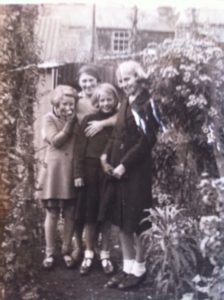
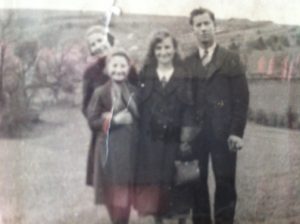
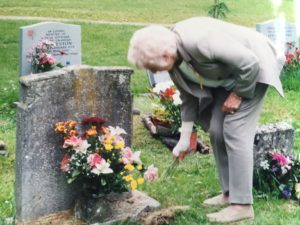
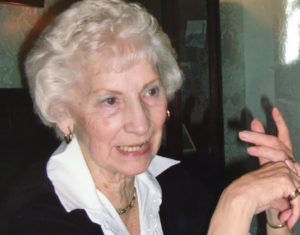
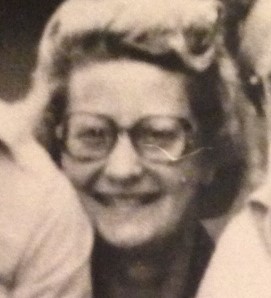
[…] Eight years ago I wrote a feature from another piece penned by Jill about her evacuation experiences. (Vivid recollections of wartime evacuation…drama and tears | Colin Grainger (colin-grainger.co.uk)_ […]